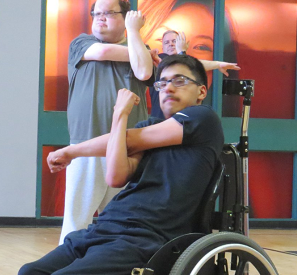You don’t have to be everyone’s teachable moment
by Beth Finke
Remember the 9-year-old who wrote a post here for Valentine’s Day years ago about how much she loves her Dad? She still does! Anja is a teenager now, and she’s back with a guest post that explains one — of many, many reasons — that is.
by Anja Herrman
My heart cracked and I pressed my head against my dad’s firm shoulder. Tears clouded my eyesight and I took deep breaths. The instant my father squeezed my arm, it all came rushing out, sobs and snot running with my speech.
Hang on, blog readers. You’re probably confused. Let me tell you the whole story.
I was in New York City to represent the KIDBOX board of directors. KIDBOX is an organization that helps parents and kids select boxes of clothing and have them shipped for kids to try on in the comfort of their own home before buying. For every box sold, KIDBOX sends a new outfit to a child in need, and the Kid’s Board works with KIDBOX to come up with meaningful projects to help spread the word about its mission to clothe one million children in need.
The instant I entered that room to meet the other kids on the KIDBOX board, I felt 17 pairs of eyes on me, burning holes in my back, watching my every move. I was the only one with a disability there.
Once I sat down, I heard whispers and snickers. “What’s wrong with her?” one kid asked. “Musta’ been in a car accident,” said another. “Well whatever it is, I hope she’s not contagious.”
How dare they insult me! I thought. It was as if tiny workers seeped into my body and began drilling holes in my heart. Nevertheless, I took the first step and continued on trying to break the ice. “Hi, I’m Anja. What are your names?”
Instantly, like I unscrewed the top off a jar of flies, the whispers started up again – well, most of them were whispers. “There’s obviously something wrong with her body and her mind,” one 10-year-old shouted out, her face contorting into an expression of rage and anger, a scowl apparent on her lips. “Plus she can’t be that smart, she’s in a wheelchair.”
Wait, what did she say? I thought. My brain just couldn’t process her words. Once it had, I began to crack. Tears came to my eyes immediately.
Although I fought and fought the stinging burning tears, I couldn’t help it. My one small whimper must have actually inspired the teacher to say something. “Hey,” he said. “That wasn’t nice. My mother was in a wheelchair and she was a whole heckuva lot smarter than you, because she was actually a good person.”
WOW! Didn’t this teacher realize that being mean back to this bully just reinforces her rude behavior? His story about his mother did little to ease me, my tears were flowing in earnest now. I bolted out of the room and made a beeline for my father, tears making rivers as I went.
“Daddy!” I cried. That was all I could get out. He understood. We locked ourselves in a bathroom stall and he waited for my tears to stop.
“Kiddo,” he said quietly. “What’s wrong?” I lay my head against his cotton shirt, which was already damp with the first wave of tears.
“Out there, kids were teasing me. They were attacking my integrity!” I said in a voice even quieter than his.
“Well, let’s go out there and show them they’re wrong!” he said.
I shook my head no. Why do I always have to be the bigger person and teach everyone everything? I shouldn’t always have to do that. “No Dad!” I said furiously, edging to the door, and gripping my purse so hard my knuckles turned white.
“Anja!” Dad said, placing a hand on my arm. “Why don’t you want to go out there?”
I was exasperated. “Dad, I do not have to go teach those kids ANYTHING. They are jerks.”
“Anything else?” my dad asked. And in fact, there was something else I wanted to say.
“I do not have to be everyone’s teachable moment just because I have a disability.”
And with that, my dad threw his hands up in defeat. “Alright, you don’t have to go back,” he said, tapping his phone. “We have to go back to the hotel anyways.”
“Could we maybe go to Times Square afterwards?” I asked, giving him a weak smile. “Maybe,” Dad answered, giving me a small smile of his own.
Later that night, as I was surfing through Broadway clips, Dad came and sat next to me. “Look, Anja, you’re right. I am sorry those kids were jerks. It’s not always going to be like this. But you know what, you probably taught them something by not going back in there,” he said. “I’m proud of how you reacted and I really do think you made the right decision.”
I laid there, momentarily stunned, too surprised to even move. Finally, at least my arms worked. I leaned over and gave him a hug. He chuckled and said, “So, what do you say? Let’s go hit Times Square.” I grinned and grabbed my purse.
As we walked out of the hotel, I realized we’d both learned a very valuable lesson that day. Just because you have a disability, that doesn’t mean you have to be everyone’s teachable moment.







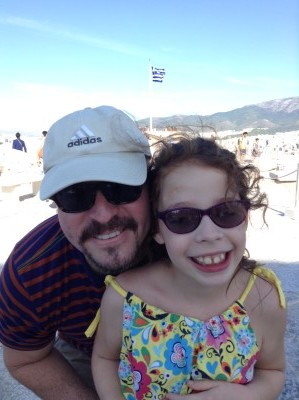
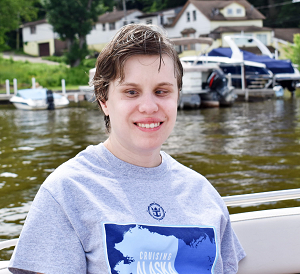
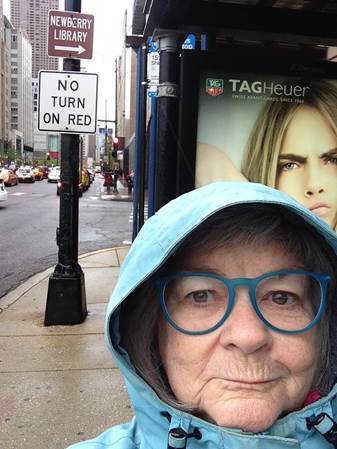
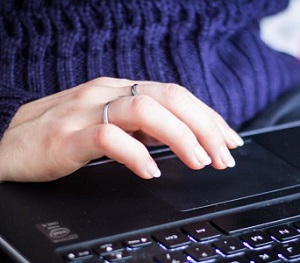
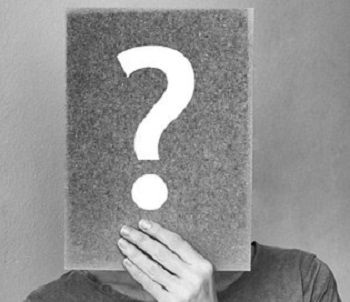 I was out with a friend last week who takes a healthy interest in exactly what makes people tick. She didn’t know me earlier in life, when I could see, and said she couldn’t help but wonder. “Do you think your personality changed when you went blind?”
I was out with a friend last week who takes a healthy interest in exactly what makes people tick. She didn’t know me earlier in life, when I could see, and said she couldn’t help but wonder. “Do you think your personality changed when you went blind?”

